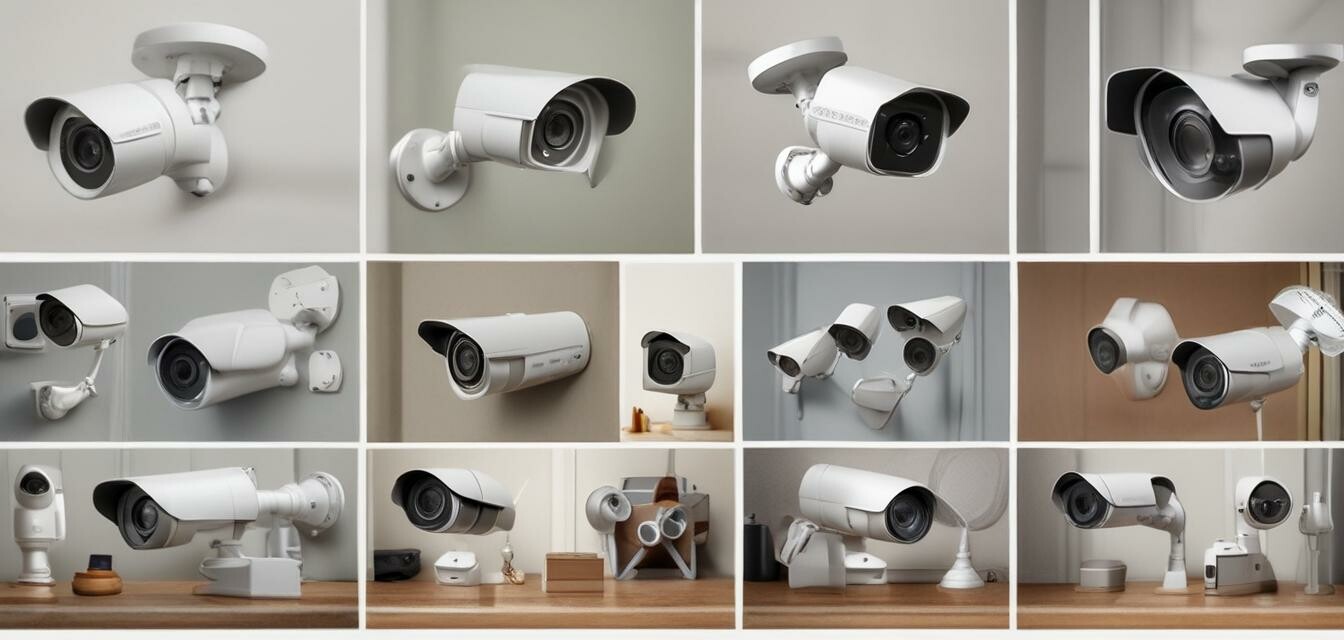
Smart Home Security
Understanding Different Types of Home Security Cameras
- Home security cameras come in various types to suit different needs and environments.
- Choosing the right camera depends on factors like coverage area, installation type, and specific features.
- Installation and maintenance differ based on the camera type and connectivity.
- Smart features such as motion detection and cloud storage enhance the utility of security cameras.
- Consider camera resolution and night vision capabilities when making your selection.
As crime rates continue to fluctuate, the need for robust home security solutions grows more urgent. One of the most significant advancements in home security has been the proliferation of various types of security cameras, each designed to meet specific needs. This article provides an overview of the different types of home security cameras, highlighting their features and ideal use cases to help you make an informed decision for your home security setup.
Types of Home Security Cameras
Choosing the right home security camera requires understanding the various options available. Below is a detailed examination of the most common types of cameras:
| Type of Camera | Features | Best For |
|---|---|---|
| Bullet Cameras | Long-range view, weatherproof, often come with night vision. | Outdoor areas such as driveways and front doors. |
| Dome Cameras | Discreet design, 360-degree view, tamper-resistant. | Indoor areas like hallways and retail environments. |
| PTZ Cameras | Panning, tilting, and zooming capabilities, remote control. | Large outdoor areas needing significant coverage. |
| Smart Doorbells | Video and two-way audio, motion detection, integration with smart home systems. | Entry points such as front doors. |
| Indoor Cameras | Compact design, often features two-way audio, motion detection. | Monitoring pets or children at home. |
| Cloud-Based Cameras | Storage of video footage online, easy access through apps. | Those wanting remote monitoring without physical storage requirements. |
Key Features to Consider
When selecting a home security camera, consider the following key features:
- Resolution: Higher resolution cameras (1080p or above) provide clearer images.
- Night Vision: Essential for monitoring at night, many cameras come with infrared night vision.
- Motion Detection: Cameras with this feature alert you when movement occurs, enhancing security.
- Audio Capability: Two-way audio allows communication through the camera, which is useful for talking to visitors.
- Cloud Storage: Cameras that offer cloud storage for video footage ensure your recordings are kept safe.
Bullet Cameras
Bullet cameras are recognizable by their cylindrical shape and are often used in outdoor applications. With excellent long-range vision, they are perfect for securely monitoring driveways, yards, and parking lots.
High-Definition Bullet Camera
A reliable solution for outdoor security with night vision capabilities and motion detection.
Learn MoreDome Cameras
Dome cameras offer a discreet appearance and are frequently used indoors and in retail spaces. Their wide-angle lens provides a broad field of view while being less susceptible to tampering.
Versatile Indoor Dome Camera
Perfect for indoor monitoring with a wide field of view and night vision capabilities.
Learn MoreInstallation Considerations
The installation process can vary significantly among the different types of cameras:
- Wired Cameras: Generally require professional installation, which can be a more permanent solution.
- Wireless Cameras: Easier to set up and relocate as needed, but they depend on good wireless connectivity.
- DIY Systems: Many cameras come with user-friendly installation options for those comfortable with basic tools.
Conclusion
In conclusion, understanding the various types of home security cameras is vital for ensuring your home feels safe and secure. By recognizing the features, functions, and installation requirements of each camera type, you can choose the best system tailored to your specific needs. If you want to dive deeper into particular types of security cameras, consider checking out our articles on smart security cameras or alarm systems.
Pros
- Variety of options to suit different needs.
- Enhanced safety through smart features.
- Range of installation methods available.
- Ability to monitor premises remotely.
Cons
- Wireless cameras may face connectivity issues.
- Some require professional installation.
- Costs can add up depending on the features selected.
Tips for Beginners
- Identify your primary areas of concern.
- Choose cameras with appropriate night vision capabilities.
- Consider your connectivity options and choose accordingly.
- Evaluate the total cost, including installation and maintenance.
- Stay informed about updates and new features in security camera technology.